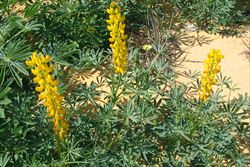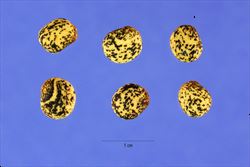Click on images to enlarge

infestation (Photo: Sheldon Navie)

habit (Photo: Sheldon Navie)

close-up of leaves and golden yellow pea-shaped flowers (Photo: Sheldon Navie)

close-up of seeds (Photo: Steve Hurst at USDA PLANTS Database)
Scientific Name
Lupinus luteus L.
Family
Fabaceae (Queensland, the ACT, Victoria, Tasmania, and the Northern Territory)Fabaceae: sub-family Faboideae (New South Wales)Leguminosae (South Australia)Papilionaceae (Western Australia)
Common Names
European yellow lupine, lupin, yellow lupin, yellow lupine, yellow sweet lupin, yellow-flowered European lupine
Origin
Native to north-western Africa (i.e. Algeria, Morocco and Tunisia) and south-western Europe (i.e. Portugal and western Spain).
Naturalised Distribution
Naturalised in some parts of southern Australia. It is most common in south-western Western Australia, but is also present in south-eastern South Australia and in the southern and central parts of New South Wales.
Also naturalised overseas in south-eastern USA (i.e. Florida).
Notes
Yellow lupin (Lupinus luteus) is regarded as an environmental weed in Western Australia. This species is grown as a fodder and grain crop, particularly in temperate regions. It has spread from cultivation and is now a weed of roadsides, disturbed sites, waste areas, parks, grasslands and coastal environs.
Yellow lupin (Lupinus luteus) is primarily a weed of disturbed sites (e.g. roadsides and wasteland) between Perth and Albany. However, it also grows on winter-wet flats and in disturbed natural vegetation (e.g. grasslands and open woodlands).

